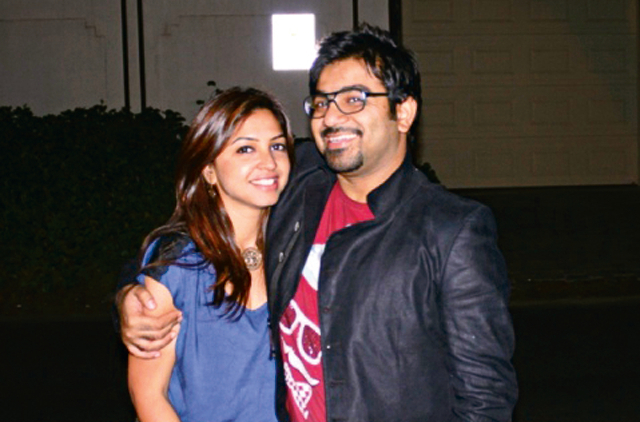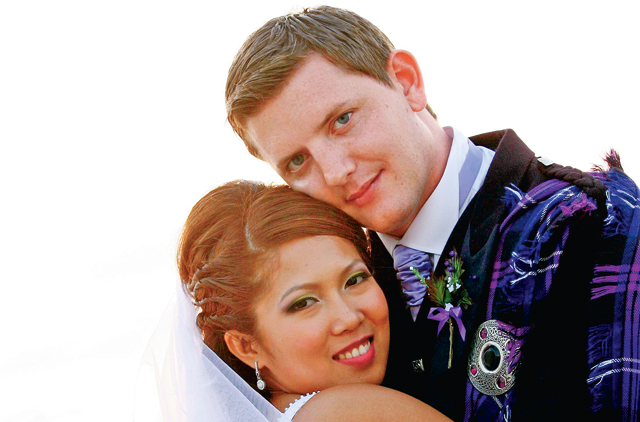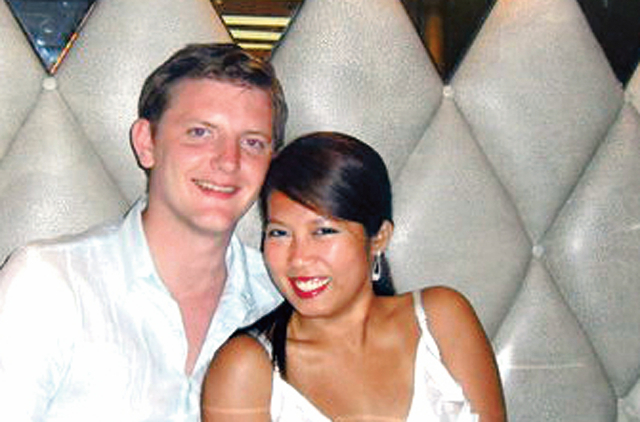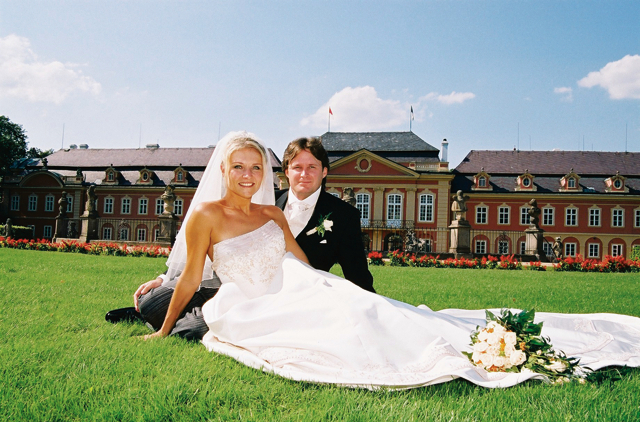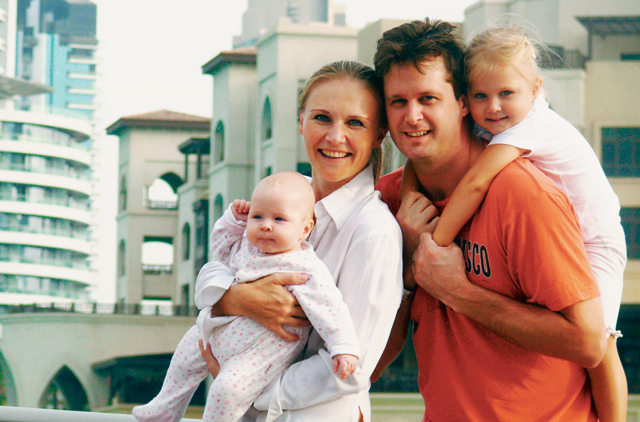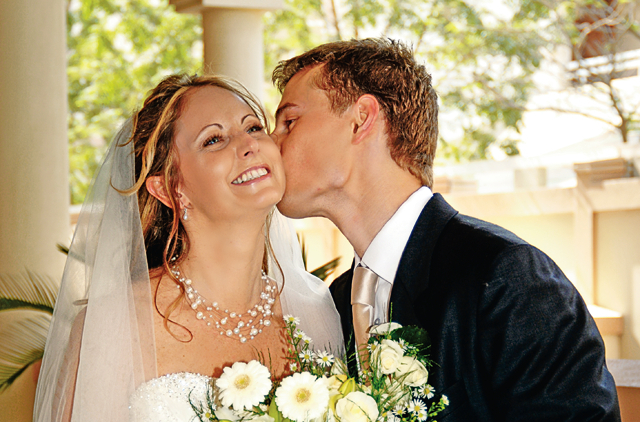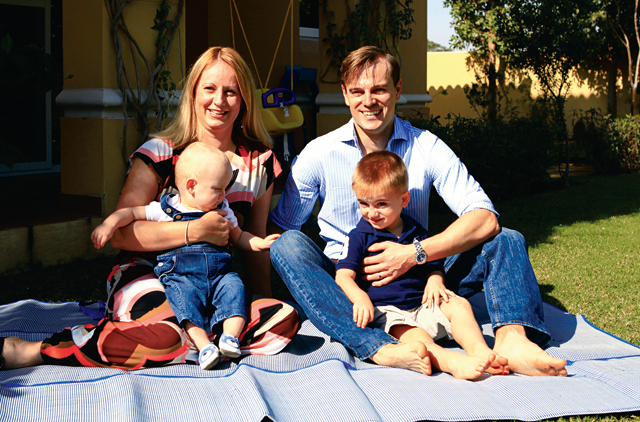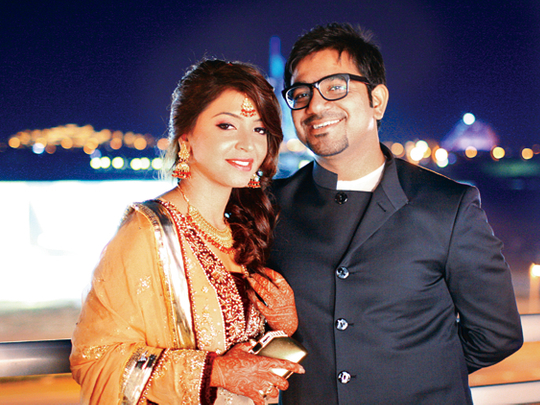
They say there are bumps on every marital road. But those bumps become extremely challenging in cross-cultural marriages: stressors are magnified and threats of unfulfilled expectations get even more distinct owing to differing cultural idiosyncrasies.
Think of some of the issues that divide cultures — language, food, rituals and traditions — and you begin to understand how testing a cross-cultural marriage can be. But with nationals from over a hundred countries living and working in the UAE, cross-cultural relationships are the norm rather than the exception. GN Focus talked to four couples who found marital bliss in the UAE.
FAHAD SHAIKH and SHAISTA JIVANI
With their countries often at political odds with each other, young Pakistani filmmaker Fahad Shaikh, 30, and Indian logistics professional Shaista Jivani, also 30, were able to build a relationship in Dubai.
First impressions
Shaista: I met Fahad at Houston in the US in 2004 at a theatre audition. I initially found him quite irritating and would often get into fights with him. We were then cast in the play as husband and wife, though I couldn’t even remotely think of Fahad as my future husband.
I guess opposites do attract, because we actually started enjoying each other’s company and began to meet more often. When Fahad moved to Pakistan from the US in 2005, I faced a dilemma about continuing the relationship, since moving to Pakistan was not an option for me.
Fahad: We, however, decided to stay in touch with each other, and met in Dubai once every couple of years when Shaista would fly down from the US and I used to come in from Pakistan. Finally, after seven years in a long-distance relationship we decided to take the oath on 11.11.11 in Dubai, with our families flying in from India and Pakistan.
Meet the parents
Fahad: Our parents left the decision to us so that we don’t blame them in the future for issues arising from our marriage. They simply shared their wisdom and stood by us.
Shaista: For my parents, the fact that Fahad did not belong to the same sect of Islam proved harder to digest than the fact that he was Pakistani. They warned me about issues that could crop up in future, especially when we had children. But they were progressive enough to support my decisions as well. I also endeavoured to analyse Fahad’s cultural nuances, and finally agreed to marry him after seven long years of courtship.
Cultural shock
Fahad: I’m always willing to learn and assimilate what is good about her culture, preferring to ignore elements that could create conflict. I also believe in adapting to situations and in being open to new experiences.
Shaista: Before committing to this relationship I prepared myself for the niggling issues and differences that could arise between us after marriage. I am confident in our ability to tackle them together as and when they arise.
Happily ever after
Fahad: I am ready to settle anywhere and would even consider moving to India if diplomatic ties between the two countries improve as I’m keen to explore opportunities in the Indian film industry.
Shaista: I will be happy to settle down wherever Fahad chooses to. But, as a couple, since it is not easy to move to either Pakistan or India we will have to choose a neutral country. I am planning a trip to New Zealand to explore job opportunities and find out if it can be our future home.
Valentine’s 2012
We never got a chance to celebrate Valentine’s Day in the last eight years. We can’t do anything special this year either, as Shaista is on her way to New Zealand.
LOREY and PHILIP FENTON
Lorey Fenton, 36, a South African freelance marketing consultant, met her husband Philip Fenton, 32, a British national and editorial director at a publishing house, at a Dubai hotel during a work meeting. They hit it off at once and continued to see each, finally tying the knot five years ago. They now live in Dubai with their two boys, aged three and eight months.
First impressions
Lorey: Once we got to know each other, Philip started sending me flowers and gifts. But when he sent me a melted Easter egg to my office, I knew he was interested in us being more than just friends. That’s when we started dating. A year later he proposed.
Philip: Following our meeting Lorey started pestering me and after about a year I finally relented and took her to dinner, which turned out to be rather a good idea.
Meet the parents
Lorey: My parents were pleased, though I think they hoped I would marry someone from South Africa so I wouldn’t live too far away.
Philip: My parents were also fine with us getting married. However, like all parents of expatriates, they also secretly and sometimes not so secretly harboured a desire I’d move back. Marrying someone from a different nationality made that less of an option. They also perhaps wanted me to marry someone English. But the issue never came up.
Culture shock
Lorey: Sometimes I struggle to understand his dry sense of humour, especially when I am upset. He is very British, what with his stiff upper lip and being quite averse to showing emotion in public, while South Africans are generally more vocal about their feelings.
The difference in language sometimes presents challenges. I need to translate all emails and phone calls from my family to Philip as we communicate in Afrikaans. Sometimes he pretends to understand when I speak to them, but I know his knowledge of Afrikaans is elementary. That said, the only real difference we have culturally is that Philip’s family celebrates Christmas on December 25 with a big turkey and all the trimmings, while mine celebrates Christmas on December 24 with a big dinner, followed by lunch the next day. Now, when we’re in Dubai, we celebrate Christmas on December 25.
Philip: Most western cultures have a great deal in common, so our differences tend to be quite minor; not understanding references to children’s TV programmes that I grew up with, for example. Lorey’s family expresses their love and affection for each other in far more emphatic fashion than the British, which I find rather awkward. The saving grace is that they try to tone it down when I’m around. The only big decision we ever had to make was whether our boys should learn Afrikaans, which was easily solved, as we agreed there was little point in doing so.
Happily ever after
Lorey and Philip: Living abroad has broadened our horizons to the point that we’d find it difficult to move back to either of our countries of origin. Fortunately, it’s not a decision we have to make for some time.
Valentine’s 2012
We don’t really enjoy going out to a restaurant on Valentine’s Day as it is usually too busy. As in other years, this year I’m planning a special romantic dinner at home with lots of chocolates on the menu.
IAN and KAREN RENTON
Scottish sales manager in a Dubai-headquartered hospitality group, Ian Renton, 26, and Filipina hotelier Karen Angelli Renton, 28, had a typical workplace romance, which culminated in marriage last year.
First impressions
Ian: I first met Karen when I came to work in Dubai in 2007. We used to work at the same company. Our relationship clicked six months after I joined, when my thick Scottish accent became a bit softer and Karen and everyone else in office began to understand what I said.
Meet the parents
Ian: We were fortunate that our parents supported us. I would however, add that there was some stress when we were first introduced to each other’s families. But once we got to know them the tension eased quickly.
Initially our parents did not really know much about each other’s countries. We once went to a Chinese restaurant with my parents and Karen broke into a conversation with a Filipino waitress in her own language. My father was impressed, thinking she could also speak in Chinese. Karen’s parents probably conjured images from the movie Braveheart, like everyone else, when they heard about Scotland. They must have expected a tall strapping man who would always wear a kilt and whisk their daughter away on a horse.
Karen: Both the mothers are now friends on Facebook.
Culture shock
Ian: There’s no denying cultural differences have played their part in our relationship. Thankfully they have never posed any challenge. The biggest difference that we encounter in our daily life stems from our varied preferences for food. While I prefer Italian and Middle Eastern cuisines, Karen loves seafood and rice. It can be a nightmare when we go out for dinner or order home deliveries. We always need to order from two different places and end up eating at different times, depending on whose delivery arrives first.
When it comes to socialising, I love to go out with my friends while Karen prefers a quiet dinner at home. We respect these differences and make sacrifices to balance out on how we socialise. Sometimes we also do things that we don’t particularly enjoy, but we grind our teeth and get on with it without uttering a word.
Karen: Life is all about adjustments and appreciating different perspectives of life. Ian has now started to speak my languages, Tagalog and Bisaya, and I’ve also begun to understand his Scottish accent.
Happily ever after
Ian: Dubai is a great place to settle down in as it’s midway between Scotland and the Philippines. However, the fast-paced life doesn’t make it an attractive retirement option. I’m sure that when the time comes, one of us will have to make a sacrifice to move even further away from home, which we are both fine with. We could move to either Australia or Canada.
Karen: We’ve both decided to stay in Dubai for a few more years and then will probably move to a country neutral to both of us. Visiting our families from time to time will always be paramount.
Valentine’s 2012
Ian: I’m not a big fan of Valentine’s Day, although I will buy flowers for Karen on the day. For us every day is Valentine’s Day.
KATERINA and OLIVER DIXON
Katerina Dixon, 35, a Czech marketing professional at a multinational hospitality chain and British national Oliver Dixon, 37, who works in the wine and spirits industry, met each other in Dubai through a mutual friend about a decade ago. Now married, the couple have two daughters, aged four and sixteen months.
First impressions
Oliver: It was love at first sight for me.
Katerina: It was on our trip around Europe — we took three weeks off from work and travelled to countries including Croatia, Austria, France and Hungary — when Oliver suddenly popped the question. I was standing in the middle of Central Park in Budapest, admiring the midnight blue sky, when Oliver got down on his knee and proposed to me. Later on, Oliver told me he’d been carrying the ring with him the entire duration of the trip, trying to hide it from me while waiting for the most opportune moment to propose.
Meet the parents
Katerina: Our parents were delighted when they heard about our relationship. However they want us to settle somewhere closer to them in the future so they can enjoy the company of their grandchildren more often.
Culture shock
Oliver: Since we stay in Dubai and communicate in English, the language difference is not an issue between us. But it turns into a challenge when I visit Katerina’s parents in Prague as their command over English is extremely basic. The whole experience of my desperation to make them understand, however, is entertaining to listeners. Our children are now learning both Czech and English, so hopefully they will soon be able to translate their grandparents’ words for me.
Katerina: When I married Oliver I had to get used to his preference for larger meals over dinner. Czechs normally eat generous portions over breakfast and lunches, followed by light dinners so that they don’t go to bed on a full stomach.
Since we’re both European, we don’t have strong cultural differences. However, we do bring with us different traditions. For instance, Czechs celebrate Christmas on December 24 whereas my husband celebrates on December 25.
Oliver: Marriage is all about compromise and mutual understanding. Now we celebrate Christmas on both days with equal fervour, making it a double Christmas of sorts, which works perfectly well for us and of course, our kids just love it.
Happily ever after
Oliver: I guess we will settle down somewhere in Europe so that we can stay closer to our families. Post retirement, I would love to settle somewhere in France as I own a lovely chateau, sitting in the midst of a fascinating French landscape.
Katerina: As long as we are close to a city and I have some time to learn French I’d definitely support Oliver’s dream of living in France.
Valentine’s 2012
We usually cook a special dinner at home and spend some quality time together. We don’t really do anything special on Valentine’s Day. We both have busy agendas at work, so it’s rewarding enough to just be at home at the end of the day and enjoy dinner together.


